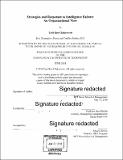| dc.contributor.advisor | Ben Shields. | en_US |
| dc.contributor.author | Rao-Chakravorti, Tarit | en_US |
| dc.contributor.other | Sloan School of Management. | en_US |
| dc.date.accessioned | 2018-09-17T15:52:50Z | |
| dc.date.available | 2018-09-17T15:52:50Z | |
| dc.date.copyright | 2018 | en_US |
| dc.date.issued | 2018 | en_US |
| dc.identifier.uri | http://hdl.handle.net/1721.1/117989 | |
| dc.description | Thesis: M.B.A., Massachusetts Institute of Technology, Sloan School of Management, 2018. | en_US |
| dc.description | Cataloged from PDF version of thesis. | en_US |
| dc.description | Includes bibliographical references. | en_US |
| dc.description.abstract | In the years following September 11th, the United States Intelligence Community has sought to understand the causes of intelligence failure that allowed such an attack to be carried out. The proposed causes of intelligence failure are myriad - from breakdowns in analytic independence, to a failure to appropriately prioritize threats. Understanding the causes of failure is critical to improving the process by which the Intelligence Community anticipates and responds to harmful actors. This paper reviews the extant literature on intelligence failure, and examines the the challenges most prioritized by the Intelligence Community, as reflected through the 2015 reorganization of the Central Intelligence Agency. The study breaks down the strategic and environmental perspective that is reflected in the new organizational structure at the Agency, and seeks to highlight the strengths and weaknesses of the new structure. Finally, the study closes by introducing three analytic techniques that have been employed in limited use by the Intelligence Community, but hold promise for improving anticipatory analysis and preventing intelligence failure. | en_US |
| dc.description.statementofresponsibility | by Tarit Rao-Chakravorti. | en_US |
| dc.format.extent | 53 unnumbered pages | en_US |
| dc.language.iso | eng | en_US |
| dc.publisher | Massachusetts Institute of Technology | en_US |
| dc.rights | MIT theses are protected by copyright. They may be viewed, downloaded, or printed from this source but further reproduction or distribution in any format is prohibited without written permission. | en_US |
| dc.rights.uri | http://dspace.mit.edu/handle/1721.1/7582 | en_US |
| dc.subject | Sloan School of Management. | en_US |
| dc.title | Strategies and responses to intelligence failure : an organizational view | en_US |
| dc.type | Thesis | en_US |
| dc.description.degree | M.B.A. | en_US |
| dc.contributor.department | Sloan School of Management | |
| dc.identifier.oclc | 1051238704 | en_US |
